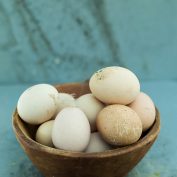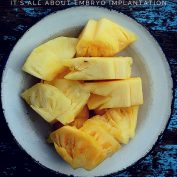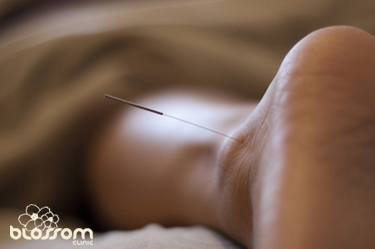
Are you wondering how acupuncture and Chinese Medicine can help your IVF cycle? Liz Richards, L.Ac. explains how and why it can assist you.
IVF and Acupuncture: Most of you have heard that acupuncturists use Chinese Medicine to support couples going through IVF. How does it help? I have been utilizing Traditional Chinese Medicine to support patients undergoing IVF since 2002 and I feel it is an honor to be a part of this very important time in a couple’s life. Acupuncture and Traditional Chinese Medicine have been used for thousands of years to treat fertility related issues. Today, modern acupuncturists are successfully using the medicine in conjunction with Western medical techniques.
When do the acupuncture treatments begin for the IVF cycle?
Most patients choosing to begin treatment three to six months before the planned IVF cycle. This 3-6 month period allows for more time to touch upon the other elements of Chinese Medicine, including nutrition therapy, stress reduction, relaxation techniques, and herbal therapy. Acupuncture can also improve sperm quality in men[i], so beginning treatment early allows for a complete cycle of spermatogenesis, which takes approximately 72 days.
Can acupuncture improve my IVF success?
Acupuncture in conjunction with IVF became popular after a research study in 2002 reported that receiving acupuncture on the day of embryo transfer increased the rate of pregnancy by 50%[ii]. This particular protocol consists of two acupuncture treatments, one immediately preceding the embryo transfer, and one upon completion of the transfer. This treatment stimulates the autonomic nervous system and from an energetic viewpoint, relaxes the muscles of the uterus, calms the mind, and increases the flow of Qi, or energy, in the uterus[iii]. Acupuncture can also help increase blood flow to the uterus and increases circulation in the pelvis[iv]. It can stimulate endorphins[v] to reduce stress, help to regulate hormones, as well as stimulate follicular development[vi].
What about acupuncture on the day of embryo transfer?
On the day of the transfer I will meet my patient at the fertility clinic 45 minutes before the scheduled embryo transfer time. In Portland, Oregon, where I practice, the fertility clinics are very familiar with the protocol and are welcoming to acupuncturists. Sometimes when I attend a transfer, I will see one to two other acupuncturists there. It is no secret that having extra support on that day makes a difference.
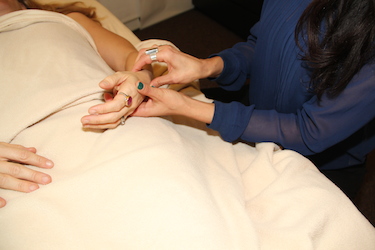
I meet my patients at the fertility clinic on the day of IVF embryo transfer and give two acupuncture treatments, one before the transfer and one directly afterwards.
The day of the embryo transfer during an IVF cycle is crucial. It is the culmination of many emotions and people are usually experiencing a mix of excitement and anxiety. If a woman has had a negative experience with a prior IVF cycle, or there are increased work demands and financial concerns around an IVF cycle, she may experience increased levels of fear, worry, and stress. Research shows a correlation between increased levels of stress and a lower number of fertilized eggs, successful pregnancies, and live births[vii] (just that fact alone is enough to cause severe stress). Acupuncture can help reduce stress, but I often refer patients out for psychological support and/or group therapy as part of the treatment plan. Group therapy, in particular, has been shown to decrease stress levels and improve pregnancy success rates in couple undergoing IVF[viii]. In addition, a treatment plan may include massage or the incorporation of relaxation techniques to facilitate stress reduction. This is a key reason why it is important to begin treatment as soon as possible before the transfer.
So is it just acupuncture that helps or other modalities too?
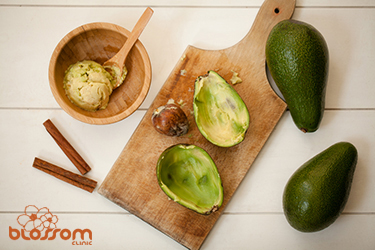
Natural treatment around your IVF cycle includes adjunct therapies that can enhance your fertility, like nutrition and massage.
Adjunct therapy also may include a session with a nutritionist, especially if the woman’s Body Mass Index is too high or too low. Obesity has been associated with sub-fertility[ix] and decreased IVF success[x]. Being underweight can also decrease fertility, by being low in nutrients, such as healthy fats, iron, B-vitamins and zinc. The importance of nutritional therapy cannot be stressed enough. According to TCM practitioner & holistic nutritionist, Rylen Feeney, “Whole foods, rich in protein, fats, vitamins and minerals are essential to creating life. A woman’s body must be taking in adequate nutrient dense foods that not only sustain her own vitality but also create enough nutrients to make healthy viable eggs, to create healthy blood and tissues to nourish uterus for implantation, to sustain the pregnancy, and to contribute to rich milk following birth”.
How do I find the right fertility acupuncturist?
A simple conversation with a practitioner of Chinese Medicine will give you a good idea if they are the right fit for you. When looking for an acupuncturist, it is important to ask them the following questions:
- Are you licensed acupuncturist and certified in herbology? It is best to find someone who has had comprehensive training in Traditional Chinese Medicine, including herbology. Usually this practitioner is someone with at least a Masters degree in Oriental Medicine.
- Do you have experience working with women and men with fertility concerns? Have you attended embryo transfers before? Do you have a specialty? I would recommend finding someone who treats women’s health concerns as opposed to someone who, say, treats only musculoskeletal issues. You might want to ask your OB/Gyn, RE, or an acupuncturist in another specialty if they have any recommendations for an acupuncturist.
- Do you have access to other treatment modalities besides acupuncture? Often a place that provides massage therapy, group sessions, and nutrition consults will provide a more comprehensive treatment plan. But an acupuncturist with a good referral network is a great place to start.
Liz Richards, L.Ac. is clinic director of Blossom Clinic, an integrative health clinic with a focus on women’s health and well-being. She is an acupuncturist who has been seeing fertility patients in Portland, Oregon since 2002 and author of Nourishing Fertility: An A-to-Z Guide, an e-book filled with her best fertility tips.
Click here get the Fertility Tips Guide!
[i] Siterman S, Eltes F, Wolfson V, Zabludovsky N, Bartoov B. Effect of acupuncture on sperm parameters of males suffering from subfertility related to low sperm quality. Arch Androl. 1997;39:155-161.
[ii] Paulus, WE, Zhang M, Strehler E, El-Danasouri I, Sterzik K..Influence of acupuncture on the pregnancy rate in patients who undergo assisted reproduction therapy. Fertil Steril. 2002 Apr;77(4):721-4.
[iii] Patton PE, Eaton D, Burry KA, Wolf DP. The use of gonadotropin-releasing hormone agonist to regulate oocyte retrieval time. Fertil Steril. 1990; 54:652-655.
[iv] Stener-Victorin E, Waldenstrom U, Andersson SA, Wikland M. Reduction of blood flow impedance in the uterine arteries of infertile women with electro-acupuncture. Hum Reprod. 1996;11:1314-1317.
[v] Chang, R., Chung P.H., Rosenwaks Z. Fertil Steril. 2002 Dec; 78 (6): 1149-1153.
[vi] Emmons, S., Patton, P. Acupuncture treatment for infertile women undergoing intracytoplasmic sperm injection. Medical Acupuncture Journal. Spring/Summer 2000-Vol. 12 / Number 2.
[vii] Cohen Klonoff-Cohen H, Natarajan L. The concerns during assisted reproductive technologies (CART) scale and pregnancy outcomesFertil Steril. 2004 Apr;81(4):982-8.
[viii] The Domar Center at Boston. Oct. 19, 2009 study presented at the American Society for Reproductive Medicine’s 65th Annual Meeting.
[ix] Van der Steeg JW, Steures P, et al. Obesity affects spontaneous pregnancy chances in subfertile, ovulatory women. Hum Reprod. 2008 Feb;23(2):324-8. Epub 2997 Dec 11.
[x] Bellver J, Ayllón Y, Ferrando M, Melo M, Goyri E, Pellicer A, Remohí J, Meseguer M. Fertil Steril. 2010 Feb;93(2):447-54. Epub 2009 Jan 26.


